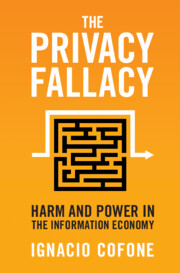Book contents
- The Privacy Fallacy
- The Privacy Fallacy
- Copyright page
- Dedication
- Contents
- Acknowledgments
- Abbreviations
- Introduction
- 1 The Traditionalist Approach to Privacy
- 2 Privacy Myths
- 3 The Consent Illusion
- 4 Manipulation by Design
- 5 Traditionalist Data Protection Rules
- 6 Pervasive Data Harms
- 7 Privacy as Corporate Accountability
- Conclusion
- Notes
- Index
1 - The Traditionalist Approach to Privacy
Published online by Cambridge University Press: 16 November 2023
- The Privacy Fallacy
- The Privacy Fallacy
- Copyright page
- Dedication
- Contents
- Acknowledgments
- Abbreviations
- Introduction
- 1 The Traditionalist Approach to Privacy
- 2 Privacy Myths
- 3 The Consent Illusion
- 4 Manipulation by Design
- 5 Traditionalist Data Protection Rules
- 6 Pervasive Data Harms
- 7 Privacy as Corporate Accountability
- Conclusion
- Notes
- Index
Summary
Chapter 1 ties together the problems of central elements of privacy law: the individual choice-based system, the fair information principles that originated it, the view that privacy is about secrecy, and dichotomies such as public versus private. We don’t have actual choices about our data beyond mechanically agreeing to privacy policies because we lack outside options and information such as what the choice means and what risk we’re taking on by agreeing. The choice-based approach creates a false binary of secret and open information when, in reality, privacy is a spectrum. The idea that someone, at any given time, has either total privacy or no privacy at all is unfounded. Additionally, data are bundled: you can’t reveal just one thing without letting companies infer other things. Reckoning with this reality defeats the popular “I have nothing to hide” argument, which traces back to Joseph Goebbels.
Keywords
- Type
- Chapter
- Information
- The Privacy FallacyHarm and Power in the Information Economy, pp. 11 - 27Publisher: Cambridge University PressPrint publication year: 2023

